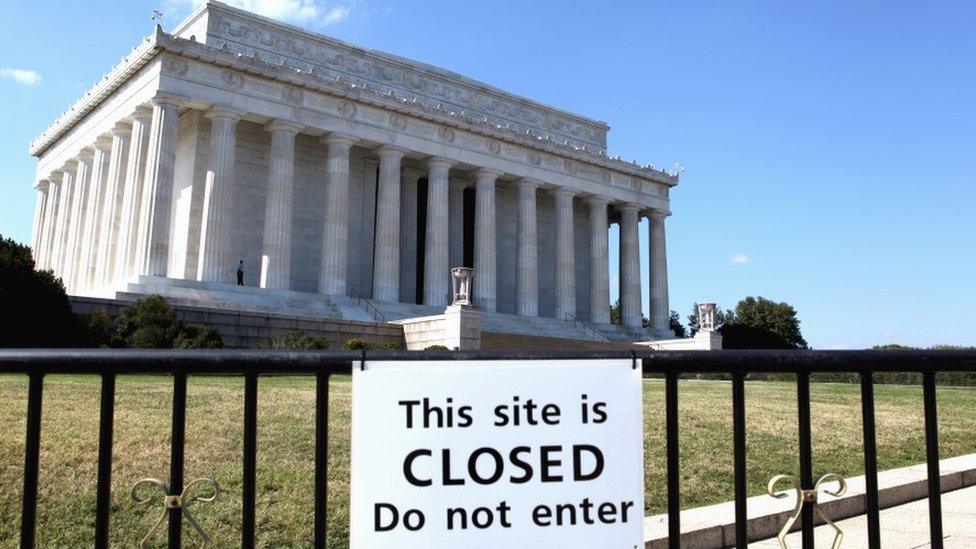Prospects dim as US scrambles to avoid government shutdown
- Published
Watch: How does a government shutdown impact the US?
The US inched closer to a government shutdown after hardline Republicans rejected a last-minute funding deal in the House of Representatives.
Congress faces a deadline of midnight on Saturday to pass a new budget before thousands of federal employees are placed on unpaid leave.
The Senate has forged ahead with plans for a temporary funding agreement - which House Republicans have opposed.
The two chambers of Congress are controlled by different parties.
The Republican-led House of Representatives failed to pass its own short-term spending bill on Friday, with 232 votes against the measure and 198 in favour.
More than a dozen of the most hardline Republican representatives voted against its passage.
After the vote on Friday, House Speaker Kevin McCarthy said the chamber might still pass a funding extension, but he declined to say what would happen next.
"It's only a failure if you quit," he told reporters.
The House adjourned on Friday evening without reaching a deal. Members will return on Saturday 10:00 local time (14:00 GMT), when more votes are expected.
Their plan would have extended funding through the end of October but included deep spending cuts that would have made it a non-starter for Democrats, who run the Senate, as well as border provisions that many Democrats have opposed.
President Joe Biden on Friday warned that a shutdown could take a heavy toll on the armed forces.
"We can't be playing politics while our troops stand in the breach. It's an absolute dereliction of duty," Mr Biden said at a retirement ceremony for Mark Milley, a senior general.
The conflicting House and Senate funding plans have increased the likelihood of a shutdown and have exposed deep rifts in the Republican party, with some lawmakers expressing exasperation at the hardline conservatives who have so far stood in the way of a funding deal.
California Republican Mike Garcia, for example, told Reuters that he felt "frustrated" as the shutdown loomed.
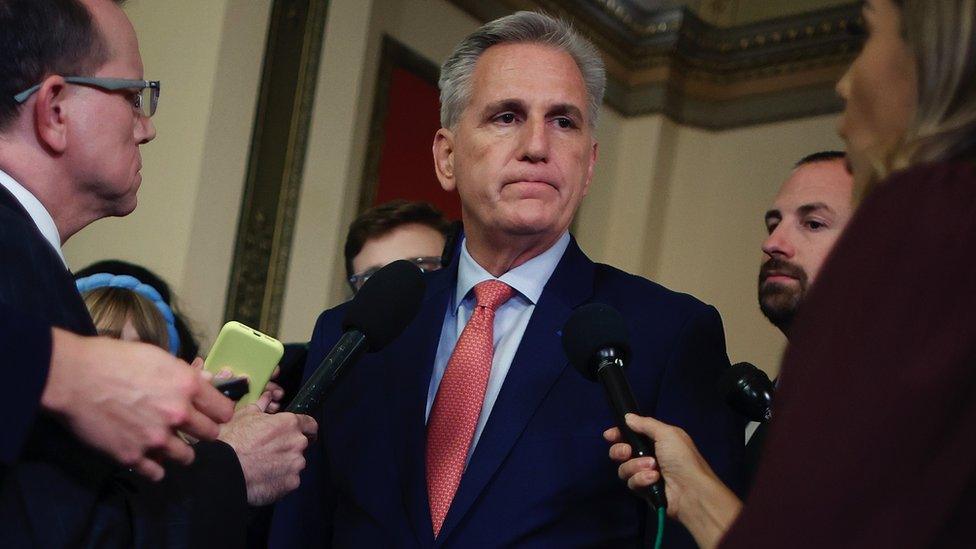
Hardline members of Kevin McCarthy's Republican House majority are refusing to back a short-term funding bill
"We don't have a good position going into what would be a negotiation with the Senate," he said.
The Senate overwhelmingly passed a procedural vote on a short-term funding bill that has bipartisan support in the chamber. The bill would avoid a government shutdown until 17 November, giving Congress more time to reach a deal on a longer-term budget.
But for that bill to become law it would have to pass in the House, where at least nine hardline members of Speaker McCarthy's narrow Republican majority have refused to support the stopgap measure.
That group has repeatedly threatened to remove Mr McCarthy as House Speaker if he relies on Democratic votes to work around their opposition and pass a funding bill without them.
On Friday, Matt Gaetz of Florida, who has been leading the charge against Mr McCarthy, said the stopgap measure "weakens the Republican position on strong border policies".
"I will be voting against this continuing resolution," he said.
Mr McCarthy has not committed to bringing the Senate's short-term funding bill to the House floor, but said a shutdown could be avoided if Democrats better addressed the issue of border security in that bill.
"Every member will have to go on record on where they stand," McCarthy told reporters. "Are they willing to secure the border or do they side with President Biden on an open border and vote against a measure to keep government open?"
Democrat Krishnamoorthi: 'Shutdown exactly what Xi and Putin would relish'
President Joe Biden's top aide, Chief of Staff Jeff Zients, told NPR News that the White House was preparing for the possibility that a last-minute deal will be cut on Saturday.
But he added that Mr Biden has no plans to personally meet Mr McCarthy.
"There's no need for a meeting right now. The meeting that has to take place is in the House of Representatives - where House Republicans come together and fund the government."
In recent months, Mr McCarthy has seen a growing ideological gulf between the moderate and right wings of his caucus.
That right-wing flank only accounts for a handful of members, but in a chamber that Republicans control by only nine seats they hold an out-sized power over proceedings.
"This is not an impossible puzzle to solve," Democratic Senate Majority Leader Chuck Schumer said. "Speaker McCarthy needs to stop letting the Maga radicals drive his decisions."
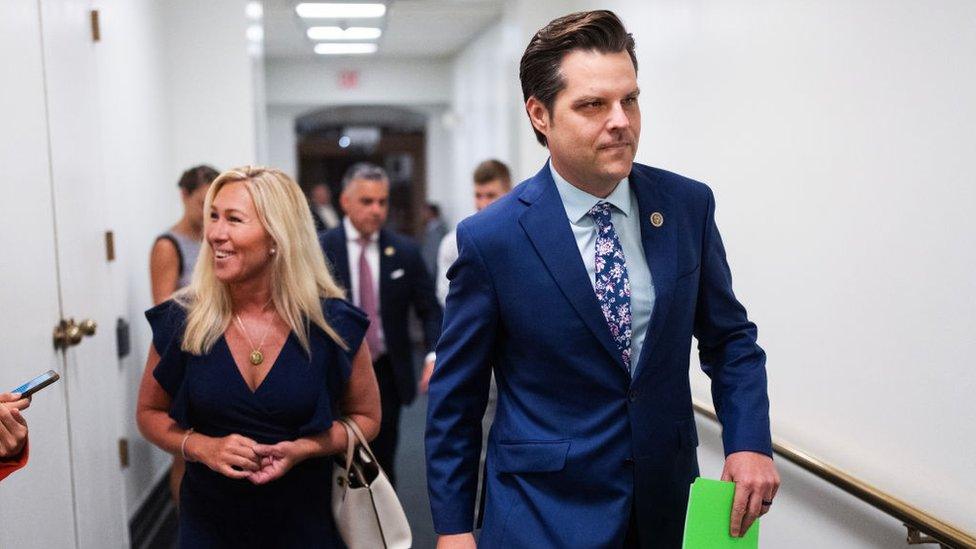
Matt Gaetz has vowed to boot Mr McCarthy as Speaker if he relies on Democratic votes to pass a spending bill
Fiercely opposed to anything that resembles business as usual in Washington, the hardline members demand that the party deliver on spending cuts and what they call conservative priorities.
That means Mr McCarthy may need to look to the opposing party to bail him out and support a short-term spending bill.
Working with Democrats is all but assured to trigger a so-called motion to vacate, the first step in forcing a vote to oust him as Speaker.
Economists have also warned that a government shutdown could damage the US economy, with Moody's warning that it could hurt the US credit rating and "underscore the weakness of US institutional and governance strength".
- Published27 September 2023
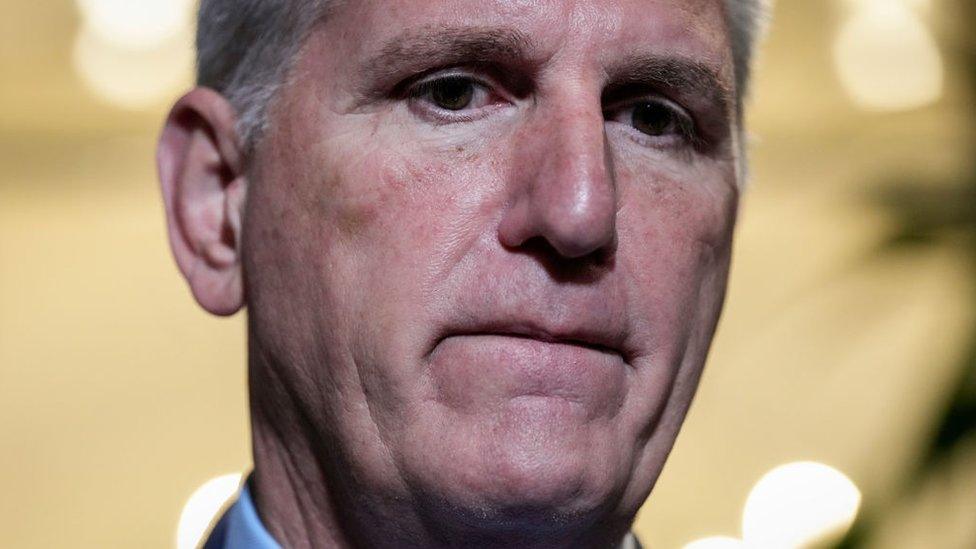
- Published22 September 2023
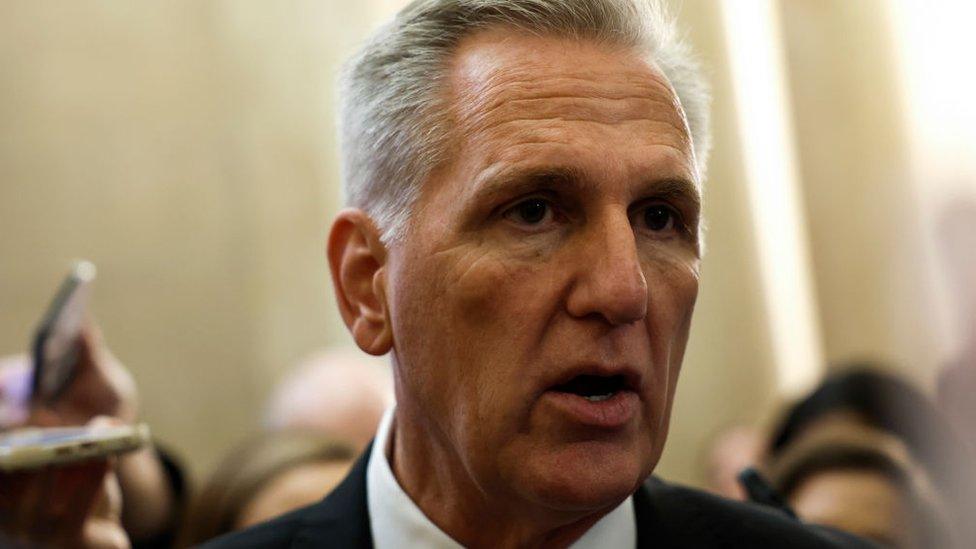
- Published1 October 2023
